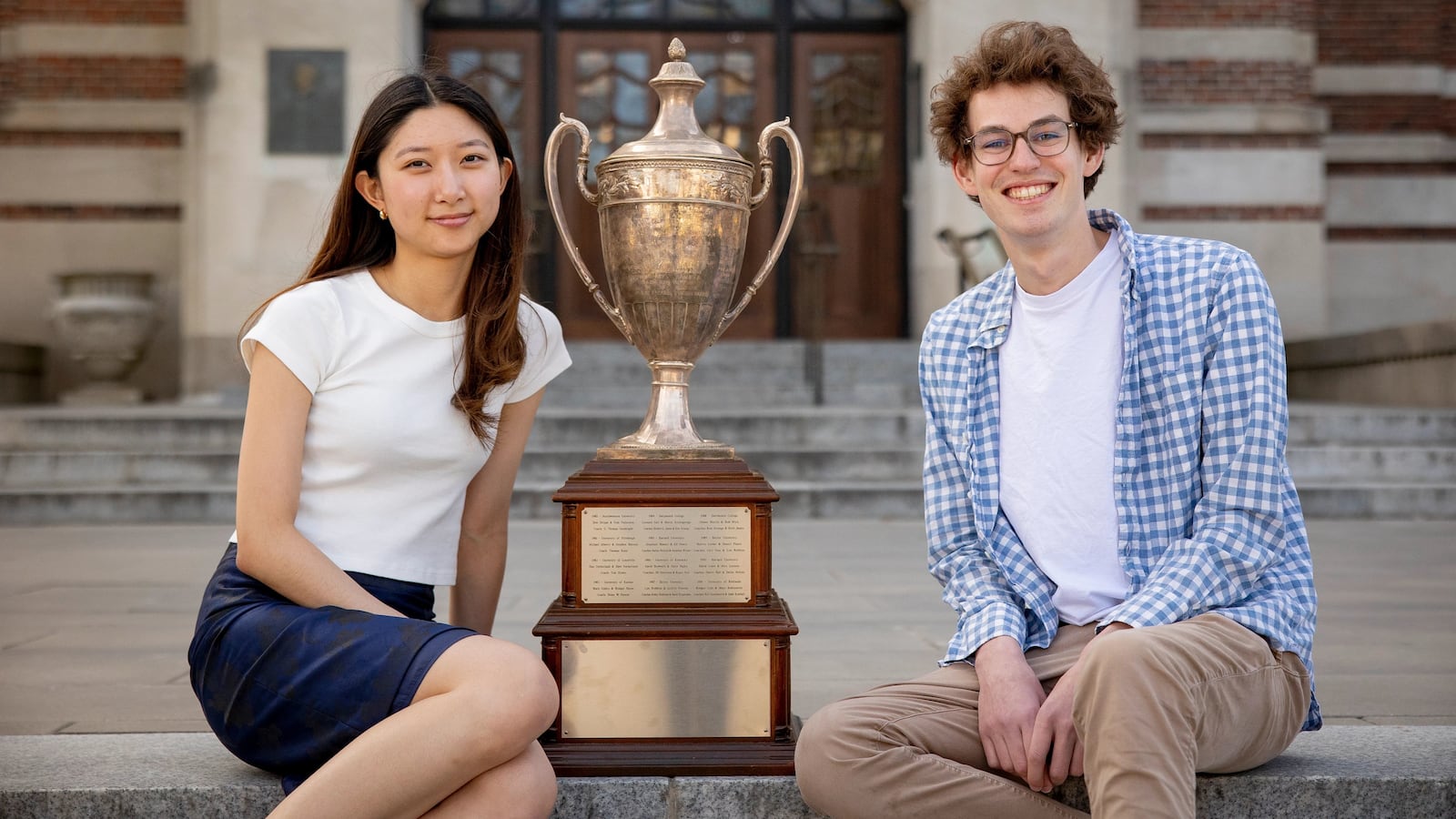Donald Trump is unlikely to follow Trisha Tewari’s advice in advance of CNN’s presidential debate Thursday night—but many watching at home would be grateful if he did.
“Hold professionalism and diplomacy at the highest level,” Tewari advises the former president. “Debates are an environment of integrity and respect, and should not deviate from their intended purpose. In order to have a productive debate, both candidates should instill the values of American democracy and try their best to understand one another’s point of view.”
Tewari, 16, knows of what she speaks. She is from Springfield, Missouri, Central Highschool’s Ozark Red team, this year’s World Schools Champions at the National Speech and Debate Tournament hosted by the National Speech and Debate Association (NSDA). Tewari and teammates Kwaku Asare-Bawuah, 16, August Keliboeker, 15, Imani Lwali, 16, and Quinn Smith, 17, know how to verbally parry, thrust, and win arguments—but in a crucible of civility and an exchange of ideas, rather than vicious personal insults scraped from the bottom of the barrel.
They, along with more of America’s champion young debaters, tell The Daily Beast they want to hear policy and specifics from Trump and Joe Biden, and a lively, though not insulting, back-and-forth. If past experience is a guide, they stand a good chance of being disappointed. While Biden may instinctively want to present a sober, policy-based vision of America’s future, Trump—who notoriously stalked Hillary Clinton around the 2016 debate stage—will likely huff, puff, and gratuitously insult his rival’s age and abilities, even though his own cognitive command has also been brought into question.
Ben Hodges, 18, who with fellow Durham Academy, North Carolina, student William Brown, also 18, won the National Champions in Public Forum Debate at the 2024 NSDA’s National Tournament, told The Daily Beast that Trump had two possible approaches. “What the Trump team may be already planning—which could doom the debate from the start—is to go out and overly assert that Biden is too old and physically incapable. Biden may do the same back to show he can stand up.
“However, Trump may, and I believe should, back down from that approach, knowing that his perception of being too aggressive and reckless could have been a turn-off for a lot of moderate voters in 2020. Largely, the independent, centrist voters they both need to win over are tired of politics, the back and forth, and the bickering, that they need a capable leader who understands the issues at hand, and a reckless 2016-esque personal attack style for Trump doesn’t match that.”
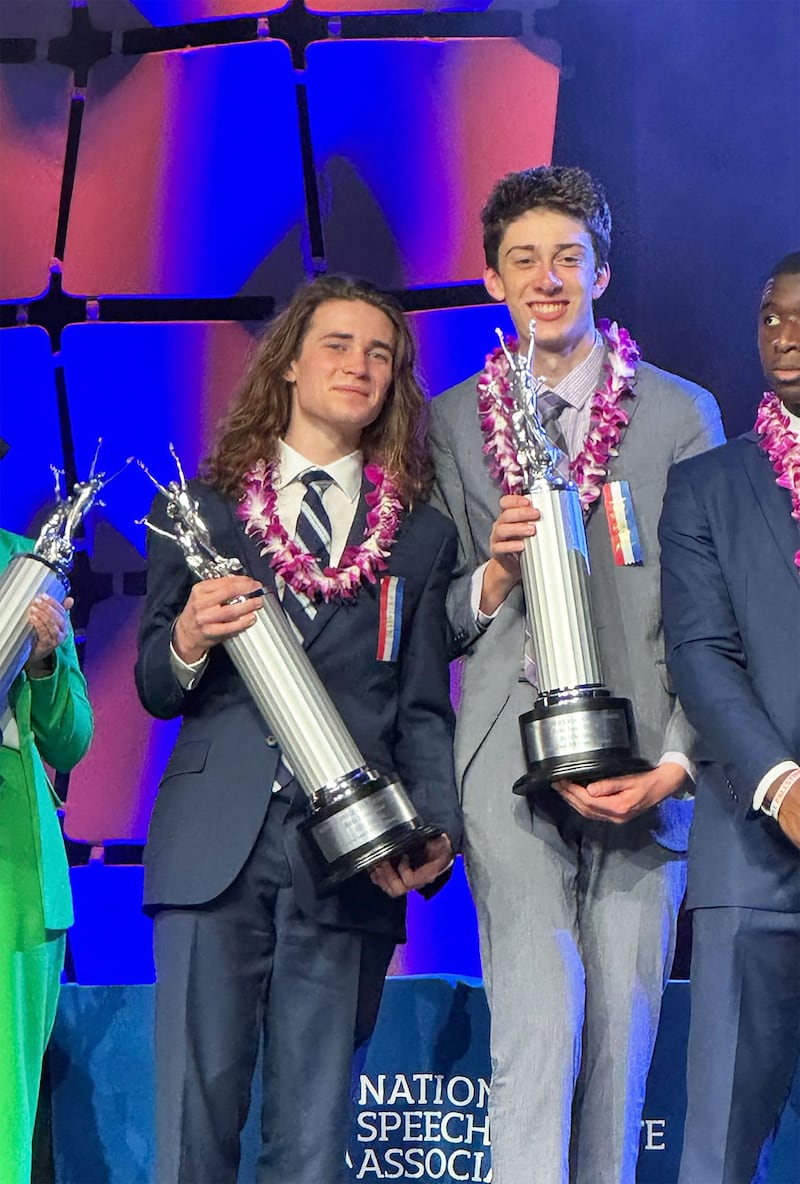
William Brown, left, and Ben Hodges.
Crawford LeavoyBiden, Hodges said, “has the benefit of having recent legislative actions and potential victories he can leverage. In debate, history is your best friend because it brings a degree of certainty that voters who are already overwhelmed can latch on to and use as reasoning to vote for him.
“This could very well support Trump though, who can paint existing crises like the border as reasons why Biden’s time in office has been a failure—and it’s almost always easier to create urgency with a bad status quo than an OK one. Overall, Biden should balance his own legislative victories while also remaining prospective to a certain degree, explaining how he would be good for a second term and Trump disastrous.”
“Trump’s greatest strength as a debater is in his strong stage presence,” Kelly Phil, 22, who with debate partner Bennett Dombcik, also 22, won the championship trophy at the 2024 National Debate Tournament for the University of Michigan. “Even his opponents can admit that Trump is an entertainer at heart. He can keep the audience engaged with simple slogans and attention-grabbing messages.
“Trump also breaks the mold of how a traditional presidential candidate is meant to debate. He often interrupts his opponents and sometimes launches personal attacks. This can, of course, be a double-edged sword. His unpredictability alienates many moderates and swing voters. But Trump’s unconventional style can catch opponents by surprise and force them to make unrehearsed statements.”
“Donald Trump is very charismatic and popular with his audience, though his weakness is to get distracted and start launching ad hominem attacks against Biden and his family,” Dombcik added. “This would divert from the policy issues that a lot of people want to heart about. Biden is the inverse of Trump. He’s pretty prepared to talk about all policy issues, but his biggest weakness is to not being able to get his supporters as riled up to support him as Trump manages to get his to.”
For Phil, Biden’s greatest strength was his policy experience. “He has deep knowledge on policy issues and has spent years deeply embedded in the establishment. Though Biden has been accused of being quite boring, his calmness can be an asset. He’s less likely to react emotionally or erratically to jabs by his opponents. To many, Biden may convey a stable demeanor that works to his benefit. On the other hand, Biden’s greatest weakness is lack of energy. He’s in his 80s and many voters feel that he is far too old to keep up with his dynamic opponents.”
Those close to Dombcik were also focused on Biden’s age, he said, and having “two presidential candidates as old as they are. They want some liveliness in the presidency. Age is going to be a very important issue at the debate, especially as either candidate tries to portray it as a negative for the other. And for those questioning Biden’s age, and whether he will be effective in a second term, it will be important to see him behave competently throughout the debate.”
Hodges said that fluency in each candidate’s speech, “and breaks in fluency, will be more important than in previous years. Any breaks in Biden’s fluency will have people thinking he’s old, even if that break in fluency has nothing to do with his age.”
‘Debate with the intent of understanding’
The young debate champions all thought the debate was a vital public discussion. “It is highly important in informing the general public on pressing voting issues,” Tewari said. “Presidential debates allow the candidates’ personalities to shine through and allow the general public to connect with them on a high level. On the other hand, presidential debates can highlight negative aspects of a candidate’s diplomacy and professionalism. Thus, carefully chosen words and phrases can either make or break a candidate. Anybody who’s going to be the president should display being a good role model.”
“I think a presidential debate is an important part of the electoral process, It allows voters to get a good sense of how the candidates respond to pressure and hard-hitting questions from both the audience and to each other,” Phil said. “The debates are also unique in that they allow the candidates to display their personalities without any middle-man. Doing well in the debates by truly appealing to the audience, and delivering a clear idea of one’s policy platforms can help candidates improve their odds in the election.”
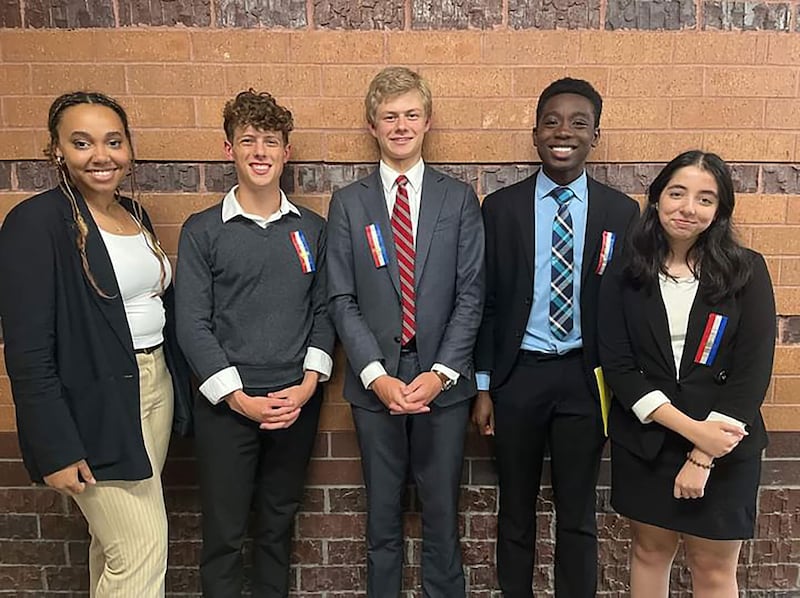
Ozark Red World Schools Champions from Springfield, Missouri Central Highschool. Left to right: Imani Lwali, Quinn Smith, August Keliboeker, Kwaku Asare-Bawuah, and Trisha Tewari.
Mrs. Karissa TaltyPresidential debates “are one of the few areas where we can see candidates side-by-side and compare the two,” said Ozark Red’s Kwaku Asare-Bawuah. “In these debates, everything about you is called into question. Talking points of each side are put forth and it offers a chance to refute them.
“For example, Biden is going to be approached with Republican talking points on the economy or immigration and that is his chance to disprove them or justify himself. These talking points are thoughts and perceptions held by common people, therefore, when they are refuted, they shift people over to the other side.”
How the candidates look has a certain “baseline importance,” Dombcik said. Hair, make-up, their suits should be presentable—Hodges thought Biden’s team may make him try to look a tad young to offset some of the age-related insults being thrown his way. How they physically relate to each other—gestures, creeping behind each other—could also imprint itself on viewers’ minds.
“I think physical behavior and style matter a great deal,” Phil said. “No matter who one’s audience is, total impartiality is impossible to expect. The clothes we wear, the way we carry ourselves, and the way we act can have an immense impact on how our arguments are perceived. Both candidates should dress and act professionally to avoid unfavorable judgements by the audience.”
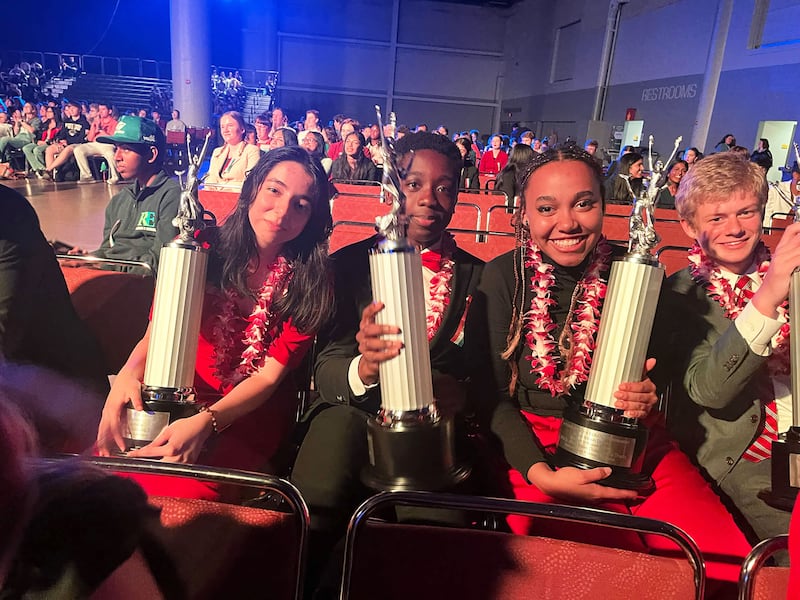
Ozark Red World Schools Champions from Springfield, Missouri Central Highschool. Left to right: Trisha Tewari, Kwaku Asare-Bawuah, Imani Lwali, and August Keliboeker.
Mrs. Karissa TaltyPreparation is all, however much either man thinks force of personality can prevail.
“A debate tactic that has proven successful over the years I’ve been in speech in debate is being a patient listener,” Tewari said. “Always allow the other side to voice their full and complete thought before diving into your response. Debate with the intent of understanding, rather than responding just for the sake of it. Both candidates must make sure to fully understand the other’s stance and viewpoint, and practice patience.” (We wish, we wish.)
The debate topic Phil and Dombcik focused on in their competition was whether the United States should restrict its nuclear forces. Throughout the year, they spent hours a day doing research “to find creative and strategic takes for both sides,” as Phil put it. “On the affirmative, we argued that the U.S. should restrict its nuclear forces. We tried to find proposals regarding a ‘no first use policy’ and tried to find variations of that policy. On the negative, we argued the U.S. should not restrict its nukes. Throughout the year, we found arguments for the preservation of the U.S. arsenal including deterrence against revisionist adversaries and assurance for treaty allies.
“Over the course of the year, we had to adapt our arguments and find new ways of discussing the topic. Because debaters prepared against the earlier variations of our arguments, we had to find new angles to maintain our strategic edge.”
Dombcik said their preparatory work ethic had been a key to why they had won—they were training six hours a day. Trump and Biden, he hoped, had done their equivalent of preparing speeches and pitches on the issues most important to voters, “and make sure they covey those efficiently and succinctly, with some emphasis so as not to come off too bland.”
Hodges and Brown’s debate topic was centered on whether the U.S. should sign a trade deal with the European Union, looking at how and where the economic benefits of such a deal would flow and be distributed. Good debating, Hodges said, was as much as what you choose to talk about as how the words you choose to unpack the issues with.
“Skeptical swing voters, inundated with an overwhelming stream of polarizing issues, want a reasonable leader,” Hodges added, so Trump would do well to scale back his bombastic theatrics and show “he cares more about the issues voters care about than about making Biden look old. People on the further left and further right may want them to spar on specific issues, whereas more moderate voters want to see civility as they debate one another, and candidates with the character and capability for office.”
“I think both candidates should think of these debates as a chance to differentiate themselves in a hotly contested election,” said Phil. “This year’s election is particularly close so every ‘good moment’ matters. If I were advising Trump or Biden, I would tell them to remain composed and avoid being swept up in the moment.
“First and foremost, both men should stay true to their roots. They should not alter their personas to alienate their core supporters. At the same time, they should act in a way that minimizes their perceived weaknesses. Biden, for instance, should aspire to have moments where he projects strength and energy to fight against the narrative that his age makes him weak.”
“Both candidates must realize that the time has come for both sides of the aisle to try and appeal to the largest voting base they can,” Ozark Red’s Keliboeker said. “Staying rooted in partisan issues is crucial to securing a primary election but the dynamics shift significantly in the context of a general election. In 2020 about 66 percent of eligible voters participated in the general election. This only demonstrates the necessity for each candidate to engage with each voter, especially those that are undecided.
“Rather than focusing on the issue of what to avoid, each candidate should aim to restore confidence in the populus of America. This necessitates a departure from the polarized issues politics has been rooted in for so long. This debate is the chance to bridge partisan divides, and cultivate to the nation a feeling of national unity. While the odds of this happening any time soon are low, it is necessary to fix the sickness of partisan polarization we have found ourselves in. If we don’t have this constructive dialog we have lost hope of a cohesive and democratically resilient nation.”
‘These debates are like a trial by fire’
Via the forum of the debate, Trump and Biden can use certain chosen issues to drive people out to vote, Hodges said. “In the back-and-forth exchanges, we will at least see both of them out of their usual echo chambers, expressing how they are actually different from their opponent and how they would get things done.”
The way an argument is packaged matters just as much as the argument itself, Phil said. “The way a speaker formulates or explains a policy can have a significant impact on how the audience receives it. When I debate, I think I try to think about the people I am speaking to. Depending on the judge I have, I’ll moderate or sensationalize a certain argument to appeal to their preferences. So, I think packaging an argument to win over a specific audience has proven useful in my debate career.

Kelly Phil and Bennett Dombcik, University of Michigan debate winners.
Marc-Gregor Campredon“In that vein, I think a good debater is cognizant of their audience. Ultimately, winning a debate does not hinge on the quality or truthfulness of an argument in a vacuum. It depends on whether the judge is persuaded by the argument. The best debaters, I think, are great adapters for that reason.”
Dombcik said it was necessary for both candidates to monitor—as all debaters do—flashes of anger that may well up inside them, and try to contain them if they do. Trump may see such displays as a USP, even if they alienate more moderate swing voters. Gladiatorial contests can be interesting, Dombcik said. “I love sports, and I love the rivalrous aspect of debating. But I prefer debates to be about the policy propositions each candidate has, assessing their own strengths and debunking their opponents, but not personally.”
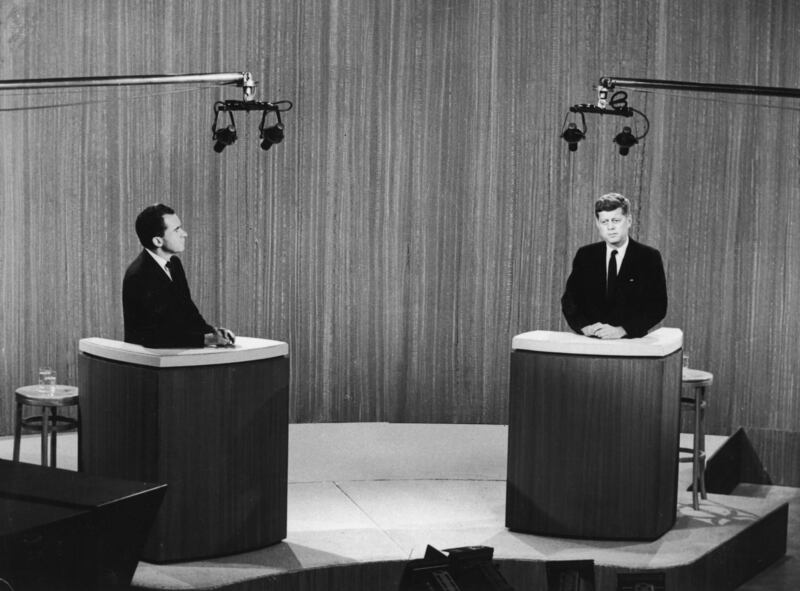
1960: Republican vice president Richard Nixon (1913-1994) (L) and democratic senator John F. Kennedy (1917-1963) take part in a televised debate during their presidential campaign.
Hulton Archive/Getty ImagesFor Asare-Bawuah, the power of the arguments within debates “can and have changed perceptions. Think back to the 1960 presidential debates between John F. Kennedy and Richard Nixon. In those debates, Nixon did extremely poorly and looked nervous and sweaty which obviously changed how people saw him. These debates are like a trial by fire and allow the public to see the candidate’s resolve, confidence, and ability to defend themselves. Success or failure to show those things could be fatal for a campaign.”
“Even stubborn voters or audiences may be fairly persuaded to change their views by a particularly emphatic speech or performance,” Phil said. “I remember experiencing this throughout my debate career. I would often begin a year of debating thinking that my opinions on a given issue would remain unchanged. However, after watching and participating in debates throughout the year, my views would often moderate.”
Hodges hopes—perhaps against hope—that Thursday’s debate, indeed any debate, should be less about “proving why your opponent is wrong, and showing why you are right for your audience—and in this case, your country.”
This may be true, but one doubts their elders will live up to the expectations of these young debate champions—who, in full flight as their words show here, might make for far more edifying primetime viewing.

